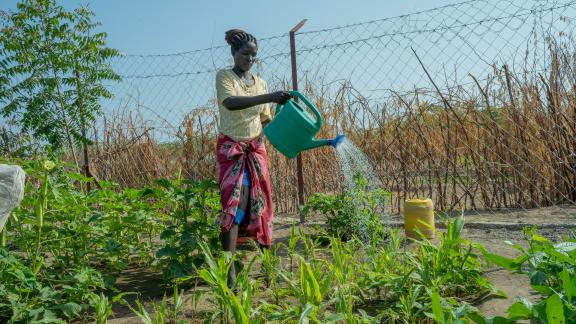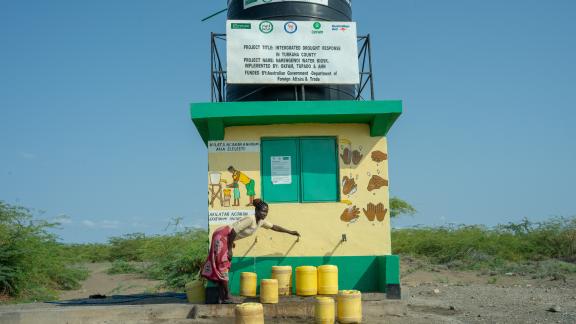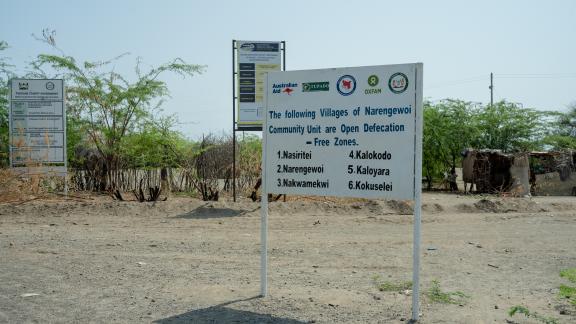Margareta Arasio, a mother of five, and a resident of Narengewoi village in Turkana is a champion of good sanitation practices and hygiene, she is passionate about it.
Margareta and her women’s group were first beneficiaries of the community water kiosk installed by Oxfam in their village Narengewoi. With water now flowing and accessible to them, Margareta and her group decided to go into farming. They first cleared some land nearby for their upcoming project but they were unable to move further due to minimal capital.
Oxfam then came on board through the DFAT project to train the women’s group made up of expectant and lactating mothers. ‘We were taught on tilling, planting and transplanting, and how to manage our crops daily. We were taught that crops are like children, they need to be attended to everyday. We were also given vegetable seeds and farming tools,” Margareta shared.

Margareta Arasio at the farm in Nareng'ewoi, Turkana. Photos: Otis Dundos.
Despite the improved nutrition and income, the children in Nareng'ewoi were still falling ill. This is when they were introduced to community-led sanitation. Margareta realized that the constant diarrhoea and typhoid her children were experiencing was because there was poor sanitation practice in her community. There were no sanitation facilities in the entire village, and most of them relieved themselves in the empty spaces beside their houses.
After learning about Community-Led Total Sanitation (CLTS), Margareta and other community members were able to dig several pit latrines and use water from the water kiosk to create handwashing stations in their homesteads. Oxfam and TUPADO also provided jerrycans and water purifying chemicals to ensure collection and storage of clean drinking water.

Margareta Arasio fetching water from newly installed point in Nareng'ewoi, Turkana. Photo: Otis Dundos.
“It is very hard to hear that a child in this village is suffering from diarrhea anymore. We drink clean treated water and most of the children can now go to school regularly. Before they were always sick, and even when they were okay, they had to go fetch water during the day instead.”
As a collective, the townspeople recognize the significance of these changes and their town is now becoming a model of community action and resilience. Margareta hopes that one day, other nearby villages will adopt similar approaches. “We no longer wait for people to come and help us. We’ve seen what we can do when we work together,” she says proudly.
Through Community-led Total Sanitation (CLTS) advocacy in Turkana, six villages in Narengewoi were certified as Open Defecation Free, positively impacting a total of 210 households in the area. Through this intervention there has been significant improvement in household sanitation practices thus reducing cases of sanitation and water borne illnesses in the town.

An Open Defecation-Free signage in Nareng'ewoi. Photo: Otis Dundos.
